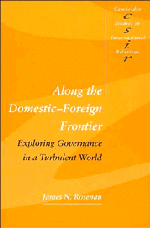Book contents
- Frontmatter
- Contents
- List of figures and tables
- Preface
- Acknowledgments
- Part I Intellectual contexts
- Part II Global contexts
- Part III Societal contexts
- Part IV Actors
- Part V Conclusions
- 21 Democracy
- 22 War and peace
- 23 Exploring governance in a turbulent world
- Epilogue
- Index
- CAMBRIDGE STUDIES IN INTERNATIONAL RELATIONS
21 - Democracy
Published online by Cambridge University Press: 19 January 2010
- Frontmatter
- Contents
- List of figures and tables
- Preface
- Acknowledgments
- Part I Intellectual contexts
- Part II Global contexts
- Part III Societal contexts
- Part IV Actors
- Part V Conclusions
- 21 Democracy
- 22 War and peace
- 23 Exploring governance in a turbulent world
- Epilogue
- Index
- CAMBRIDGE STUDIES IN INTERNATIONAL RELATIONS
Summary
Earlier we had order and no freedom. Now we have freedom and no order. Is it not possible to have both?
Voter in 1996 Russian electionWe just want change, even boring change will be better.
Voter in 1996 Spanish electionThese frustrated expressions highlight the central theme of the chapters that conclude this inquiry. They pose the challenge of whether a fragmegrative system can undergo change and sustain effective governance that at least avoids collapse into widespread disorder and violence, if not outright war, and that at most does so through widespread democratic practices. In the ensuing analysis the challenge is broken down into three parts. This chapter looks at the prospects for democracy along the Frontier, while the next probes the likelihood of interstate war and the final chapter assesses the chances of effective governance evolving in the new and widening overlap of domestic and foreign affairs.
On the quality of governance
In view of the criss-crossing currents of change that mark the politics of the Frontier – the emergence of new SOAs, the competition for shifting loyalties, and the fluctuation of identities – the question of whether democratic practices and institutions can evolve along the Frontier looms large. As expanding and contested political space that does not conform to established territorial boundaries, the Frontier has yet to develop extensive mechanisms for framing and implementing policies based on procedures that fairly represent the ever greater numbers of interests and people affected by the politics of the Frontier.
- Type
- Chapter
- Information
- Along the Domestic-Foreign FrontierExploring Governance in a Turbulent World, pp. 403 - 412Publisher: Cambridge University PressPrint publication year: 1997

